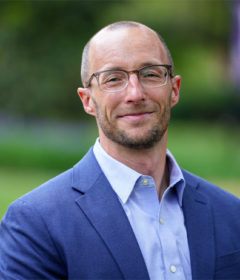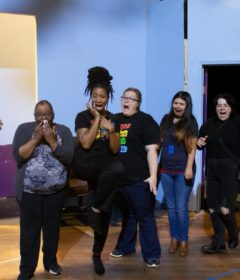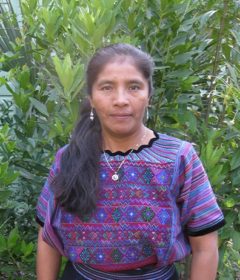Stetson Poetry Workshop Highlights Diversity and Acceptance
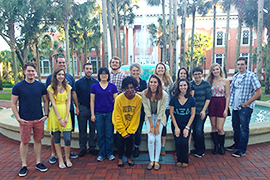
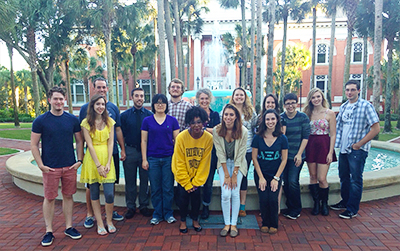
“The more differences that exist among us, the more chances we have to query our own assumptions,” said Terri Witek, Ph.D., professor of English and award-winning poet, about her poetry workshop. It is not unusual to find extensive diversity in her classroom because she provides a safe place for people with different majors, ethnicities, genders, sexual orientations and identifications, religions and more to express themselves in a friendly classroom environment.
“I was surprised by how diverse the classroom was during my first semester of workshop last fall, and this year is no different,” said Cambria Gysi ’17, education major. “I think diversity is positive for growth. We all have different perspectives that reflect in our poems, and working with others helps improve our work more than we knew possible. With diversity in the classroom, people are not afraid to tell you what doesn’t work, what is beautiful, and what parts need a little help, and, for that, I am grateful,” she said.
Gysi is a returning workshop student of Witek this semester, and her classmates recognize her as a poet whose strength is writing about her religion. “I will admit it is sometimes hard to write about my beliefs knowing that 20 other people are going to have different views, but I think that may be the beauty of it,” Gysi reflected. “Because Stetson is a liberal arts university, I know that when I do write about Him, my peers can look past any issues they have with Him and appreciate the piece itself.”
Differing beliefs is only one ingredient of the melting pot that a workshop class provides. Although one might expect only English majors to take an English class, Witek’s poetry workshop defies this notion as seen through Gysi. Students from all majors are drawn to the class, and some students’ work is defined by their studies, including physics major Joshua Geary ’16, who uses his knowledge of science to write poetry.
“Some people are confused as to why I would take the class,” said Geary, who is also a returning workshop student. “The simple answer is that I like to write poetry. I’ve found that I’m good at stringing words together so that they fit into a certain meter or form. This probably comes from the systematic approach to life I’ve adopted while immersing myself in the sciences,” he said.
“It’s wonderful that the number of different majors in the room have multiplied,” said Witek. “Hearing Josh use physics to think about received poetic forms stretches doors wider/wiser on their hinges for all of us.”
“Within the workshop there are always people who enjoy the perspective that non-English majors bring,” Geary agreed. “All in all, I think I’ve developed most as a writer because of this inherent divide between science and poetry. Uniting the two is part of the challenge and I’m grateful for the experiences I’ve had.”
Ashley Sullivan ’17, English major, also a returning student of Witek, is not afraid to incorporate controversial current events in her work and assert her passion. “Workshop is a great experience, really,” said Sullivan, “and I have to say that even when I involve politics in my work, people take it very well. They offer insightful input and they don’t treat it mockingly; people take it seriously, and I really appreciate it.”
“I hesitate to call any classroom at Stetson diverse, simply because of the population on campus,” Spinelli began, “but I have to say that despite any perception of diversity I might have, the classes never fail to surprise me regarding representation. It’s always such a joy to get different viewpoints than my own. I like to get out of my own head.”
Witek also expressed our need as a country to strive toward diversity, especially in the classroom. “I am very concerned with workshops being predominantly white, since a new study suggests that many forces driving literary life may create ‘white rooms,’” Witek said. “The professional conversations started online about racist pedagogy in this last year have been bracing and helpful. So the moments in poetry workshop like the one in which five Latino students from different cultures recognize each other and fly their various uses of Spanish across the room for a minute are a delight.”
Witek has recently taken part in developing a new low-residency M.F.A. in creative writing which seeks to bridge the gap between all cultures in the Americas. Students meet twice a year for 10 days to work in New Smyrna in June and travel abroad to different countries like Brazil, Cuba, Mexico and more in January. The goal of the program is to not only become a better writer, but to become a global citizen. “Our new M.F.A. of the Americas is an effort to work cross-culturally and internationally in ways whose outcomes are so far unknown,” said Witek about the new program. “But they represent a belief in the necessity of creating occasions for hope.”
Witek reflected on one of her proudest moments as an instructor of poetry and remembered a previous student, James Allen Hall, Ph.D., who went on to become an award-winning poet after publishing his first book of poetry. “Jamie came into my office hours and asked me if he could ‘use French’ in a poem. The poem was a beauty, and the lovers were men,” Witek recalled. “When Jamie was invited to read at Stetson years later, he had a book, a degree and a job teaching poetry workshops as a professor himself. He testified to how important the whole poetry workshop was to him as a young, gay poet. He then read his still-wonderful coming out poem from an old Touchstone to the workshop. I’d say we both cried, but I won’t speak for him,” she said.
It is apparent how deeply appreciated Witek is by her students from their testimonies about her class and by how often her students return to take her workshop again. “I love poetry workshop,” said Gysi.“It’s one of my favorite classes thanks to Terri. She is open to hearing any kind of work from any perspective. It’s hard to find an unbiased person help you improve your writing.”
Although her work may not be easy, it is rewarding for Witek to facilitate the expression of all of her students’ voices. “What I think really helps me most as a teacher is also the most challenging—shifting the conversation beyond the initial material, which only gets you part of the way toward creating an interesting poem, to the making,” said Witek. “Happily, that’s the poetic challenge tossed, blown, prayed, thrown down and detonated by us all.”
For more information about Stetson’s low-residency M.F.A. in creative writing, contact Terri Witek at [email protected] or visit https://www.stetson.edu/other/academics/programs/creative-writing-mfa.php.
By Nicole Melchionda

